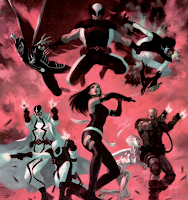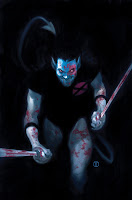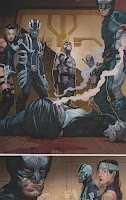Anyway, these are my choices for the ten best books of 2012. They're in alphabetical order because thinking about which year-long book rates higher than another year-long book is HARD and I don't get paid to do things that are HARD. Or get paid to do things.
Captain America
 Honestly, when I was forming this list, I wasn't sure Cap was going to make it. Steve Rogers is my favorite character in the Marvel Universe and Ed Brubaker has done wonders for the character and for the story and for the Marvel Universe in general. That said, this year was probably my least favorite year for Cap. It wasn't particularly bad, but I felt like the last couple arcs just really dragged on. Still, this makes the list for Brubaker's last issue, which was tough to get through. Not because it's bad, not because it's disturbing or anything, just because it was hard. End of an era.
Honestly, when I was forming this list, I wasn't sure Cap was going to make it. Steve Rogers is my favorite character in the Marvel Universe and Ed Brubaker has done wonders for the character and for the story and for the Marvel Universe in general. That said, this year was probably my least favorite year for Cap. It wasn't particularly bad, but I felt like the last couple arcs just really dragged on. Still, this makes the list for Brubaker's last issue, which was tough to get through. Not because it's bad, not because it's disturbing or anything, just because it was hard. End of an era.Captain Marvel
 You want to win me over on a new book/a new design for an old character? Have Jamie McKelvie design the costume. I was already onboard when I heard it was Kelly Sue DeConnick and the stuff I'd seen from Dexter Soy was good, but McKelvie killed it with the costume design. There was a huge need for a solo book featuring a woman lead in the Marvel Universe (FUN FACT: There still is) and this book is a fantastic base. Good stories, good characters, engaging dialogue, it's all there. You want to read a good book starring a true superhero? Captain Marvel is it. You want to try to get more female role models in comics to share with women or girls in your life? Captain Marvel is it.
You want to win me over on a new book/a new design for an old character? Have Jamie McKelvie design the costume. I was already onboard when I heard it was Kelly Sue DeConnick and the stuff I'd seen from Dexter Soy was good, but McKelvie killed it with the costume design. There was a huge need for a solo book featuring a woman lead in the Marvel Universe (FUN FACT: There still is) and this book is a fantastic base. Good stories, good characters, engaging dialogue, it's all there. You want to read a good book starring a true superhero? Captain Marvel is it. You want to try to get more female role models in comics to share with women or girls in your life? Captain Marvel is it.Daredevil
Mark Waid's run on Daredevil had me a little nervous before it started. I like DD quite a bit and I was curious to see, when I started hearing interviews, how exactly Waid planned to ignore Daredevil's recent trend towards the Shadowland arc. Well, not ignore, but...okay, ignore, but not in that way. How Murdock was going to play it like it never happened, just come right back and do what he does. Waid did a great job in his first year of the book to sell me on his new take. This year started to get into that Shadowland-twisted mind and the effects it's having on Matt's regular life. Good to see it all working.
Hawkeye
 My vote for best new book of the year. The writing is fun and fresh. The enemies are equal parts threatening and not overly menacing (the issue with a Hawkeye book is remembering that he's not really high-powered, so you can't stick him up against regular Avengers villains with regularity because he probably wouldn't win). Still, I think Hawkeye is a reasonable fan favorite who hasn't been able to maintain that love through a full solo series. This one, written by Matt Fraction and beautifully illustrated by David Aja, has that potential. It's been great through six issues, here's hoping it can keep it up (I feel confident).
My vote for best new book of the year. The writing is fun and fresh. The enemies are equal parts threatening and not overly menacing (the issue with a Hawkeye book is remembering that he's not really high-powered, so you can't stick him up against regular Avengers villains with regularity because he probably wouldn't win). Still, I think Hawkeye is a reasonable fan favorite who hasn't been able to maintain that love through a full solo series. This one, written by Matt Fraction and beautifully illustrated by David Aja, has that potential. It's been great through six issues, here's hoping it can keep it up (I feel confident).Journey into Mystery
I think all of Tumblr would agree with me when I say that Journey into Mystery was a fantastic book. I wasn't as into the love story as Tumblr was but I respect it. It still added layers to characters and a relationship hitherto unexamined in Marvel. I also appreciated, from the get-go, the new Thor-Loki dynamic. It was lovely without being corny or straying too far from what we know their past relationships to be. This is what Loki would be like if you stripped away all the hatred and replaced it with a child's love. He was fascinating to watch, especially with that foreboding feeling always in the back of your mind asking how long he had. Great characters and story, heartbreaking finish.
Secret Avengers
 Okay, this is the problem with a 2012-review list in a year I didn't have a blog. I'm not ENTIRELY sure where Secret Avengers started the new year. I might be missing some plot-lines when thinking about my recap. This year, though, if memory serves, largely dealt with Remender's set-up in X-Force of the Father and his robot toys. It was a compelling story, especially when Ant-Man (Eric O'Grady) died and was replaced by a Descendent (THE BLACK ANT), thus infiltrating the team. You knew everything was going to break down but you weren't ever sure when. It was always worth reading and the team, in my mind, never had a real weak spot.
Okay, this is the problem with a 2012-review list in a year I didn't have a blog. I'm not ENTIRELY sure where Secret Avengers started the new year. I might be missing some plot-lines when thinking about my recap. This year, though, if memory serves, largely dealt with Remender's set-up in X-Force of the Father and his robot toys. It was a compelling story, especially when Ant-Man (Eric O'Grady) died and was replaced by a Descendent (THE BLACK ANT), thus infiltrating the team. You knew everything was going to break down but you weren't ever sure when. It was always worth reading and the team, in my mind, never had a real weak spot.Ultimate X-Men
This one was a surprise to me too. Not like, the book's quality surprised me, more it surprised me when my brain was like "Right, let's put Ultimate X-Men on the list." It wasn't ever a bad book, I just didn't expect it to be on this list, nor did I expect my brain to not make any counter-arguments against putting it on this list. I never really considered myself too involved in the Ultimate Universe, preferring the regular 616 Universe. Still, I kept up with all the books and tried to remember as much of the chronology as I could because GUYS, I love comics. When I said I couldn't point to one aspect of the book that would counter its inclusion on this list, that kind of goes both ways. I also can't really point to one aspect that keeps me reading the book. It's compelling enough to keep me coming back every week and to look forward to reading it. I think they've got a lot of irons in the fire. I'm excited. That's really what it comes down to.
Uncanny X-Force
 Obviously this is on my list. I don't know if you need me to talk more about it after this, this, and, most of all, this, but I certainly could. I won't for now. Just suffice it to say that I adored this book and I'm very upset it's over. I'm also going to really miss these covers. I never really talked about the art in all of these reviews because I tend to be so taken by the writing, but the art always impressed, no matter the artist. Just some wonderful renderings, not to mention the new X-Force costumes everyone got. GRANTED, not all of this was this year, but it's still a great series. I hope the two new X-Force books hold up even half as well.
Obviously this is on my list. I don't know if you need me to talk more about it after this, this, and, most of all, this, but I certainly could. I won't for now. Just suffice it to say that I adored this book and I'm very upset it's over. I'm also going to really miss these covers. I never really talked about the art in all of these reviews because I tend to be so taken by the writing, but the art always impressed, no matter the artist. Just some wonderful renderings, not to mention the new X-Force costumes everyone got. GRANTED, not all of this was this year, but it's still a great series. I hope the two new X-Force books hold up even half as well.Winter Soldier
After Cap, because I'm a sucker for Cap, Bucky Barnes has got to be at least far in the running for number two favorite in the Universe. I think he's developed so well from a character that was, after being reintroduced by Brubaker a few years ago, already exciting and thought-provoking. The Winter Soldier book really played to Brubaker's noir strengths, so you kind of already knew going in it was going to be something special. A good character, a good writer who really developed the character, the setting, the low-down avoidance of the rest of the Marvel Universe...it was all there, all prime for a good book. I also love the Bucky-Black Widow relationship, so another way to examine that is certainly welcomed. It's been gripping all the way through. Brubaker's leaving the book in early 2013 and handing the reins to Jason Letour. I hope it continues to flourish.
X-Factor
I love this book. Like Ultimate X-Men, I can't really point to what I love or to things I don't love. It ranks higher in my book than Ultimate X-Men, but it's that same feeling of "if someone asked me why I should read this book, I wouldn't have a real answer." Maybe that's not the right way to review something, but doesn't that still say something? If I did have to choose something to point to, it's the idea that this team really acts like a family. The X-Men have always prided themselves on that, but there's always been some amount of dilution, especially as the brands succeeded on their own. I don't think anyone on X-Factor is particularly loved (or needed) outside of their little corner in the Universe, yet together they all act like a family or bicker like a family or love one another like a family. It feels good. I'm excited for this book going forward, too, as the one character I really couldn't bring myself to care about (Rahne, sorry anyone who loves her, I really did try) is off the team, at least for a bit. Also, I really like Madrox.
TOMORROW: My most looked-forward to books as we enter 2013.
















